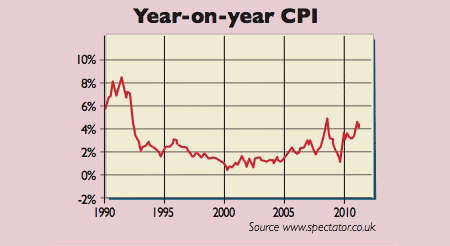Can we inflate our debt away?
The Bank of England says inflation is due to temporary factors and should come down soon. But is the Bank deliberately keeping inflation high to erode the real value of debt? If so, how long can they keep this up before the markets catch on?
Get the latest financial news, insights and expert analysis from our award-winning MoneyWeek team, to help you understand what really matters when it comes to your finances.
You are now subscribed
Your newsletter sign-up was successful
Want to add more newsletters?

Twice daily
MoneyWeek
Get the latest financial news, insights and expert analysis from our award-winning MoneyWeek team, to help you understand what really matters when it comes to your finances.

Four times a week
Look After My Bills
Sign up to our free money-saving newsletter, filled with the latest news and expert advice to help you find the best tips and deals for managing your bills. Start saving today!
The annual rate of consumer price inflation (CPI) remained stable at 4.5% in May, the highest level since September 2008. Dearer food offset the post-Easter fall in air and sea-travel costs. Inflation continues to spread, according to Michael Saunders of Citigroup. He said that 80% of the items in the CPI basket are now rising at over 2% a year. CPI is widely expected to climb to 5% as food prices continue to feed through and energy bills rise. Unemployment fell by 88,000 in the three months to April, the biggest drop in a decade, although the trend flattened in March and April. And so far there is no sign of a wage-price spiral: average earnings grew by just 2.2% last month.

What the commentators said
The Bank of England says inflation is due to temporary factors such as commodity price and VAT hikes, and should soon come down. So raising rates now would risk undermining already weak demand. The trouble is, said Jeremy Warner on telegraph.co.uk, we've been hearing this "for an awfully long time now, and still inflation doesn't abate".
The Bank of England has a lousy record on inflation, noted Stephanie Flanders on bbc.co.uk. Since May 2007, the average monthly CPI figure has been 3.5%, compared to the 2% target. The Bank "neither prevented nor even predicted" this. One study shows that between August 2007 and May 2010 its average forecast for inflation a year ahead was 1.9%. But the average turnout was 3.2%.
MoneyWeek
Subscribe to MoneyWeek today and get your first six magazine issues absolutely FREE

Sign up to Money Morning
Don't miss the latest investment and personal finances news, market analysis, plus money-saving tips with our free twice-daily newsletter
Don't miss the latest investment and personal finances news, market analysis, plus money-saving tips with our free twice-daily newsletter
The Bank's poor forecasting shows that it "doesn't understand inflationary pressures", said Fraser Nelson on Spectator.co.uk. If it weren't for this "cock-up", you might think that the Bank was deliberately keeping inflation high, thus allowing our salaries and earnings to be devalued. Inflation also erodes the real value of debt, which is fixed in nominal terms. "Inflationary default is the oldest trick in the book." By ignoring inflation, "or feigning constant surprise and dismissing it as a blip, [an indebted government] can shaft its creditors".
But this wouldn't be a long-term solution, said a Capital Economics note. One key problem is that markets eventually cotton on, and send long-term rates up, increasing the cost of funding deficits and new debt. And governments would want to get inflation back down at some stage. This isn't a painless process; history shows it usually involves causing a downturn. So inflating debt away is easier said than done.
Get the latest financial news, insights and expert analysis from our award-winning MoneyWeek team, to help you understand what really matters when it comes to your finances.
MoneyWeek is written by a team of experienced and award-winning journalists, plus expert columnists. As well as daily digital news and features, MoneyWeek also publishes a weekly magazine, covering investing and personal finance. From share tips, pensions, gold to practical investment tips - we provide a round-up to help you make money and keep it.
-
 8 ways the ‘sandwich generation’ can protect wealth
8 ways the ‘sandwich generation’ can protect wealthPeople squeezed between caring for ageing parents and adult children or younger grandchildren – known as the ‘sandwich generation’ – are at risk of neglecting their own financial planning. Here’s how to protect yourself and your loved ones’ wealth.
-
 What are Avios-only flights and who is eligible?
What are Avios-only flights and who is eligible?Avios-only flights have proved incredibly popular since launching in 2023. We explain what they are, how they work and who qualifies

